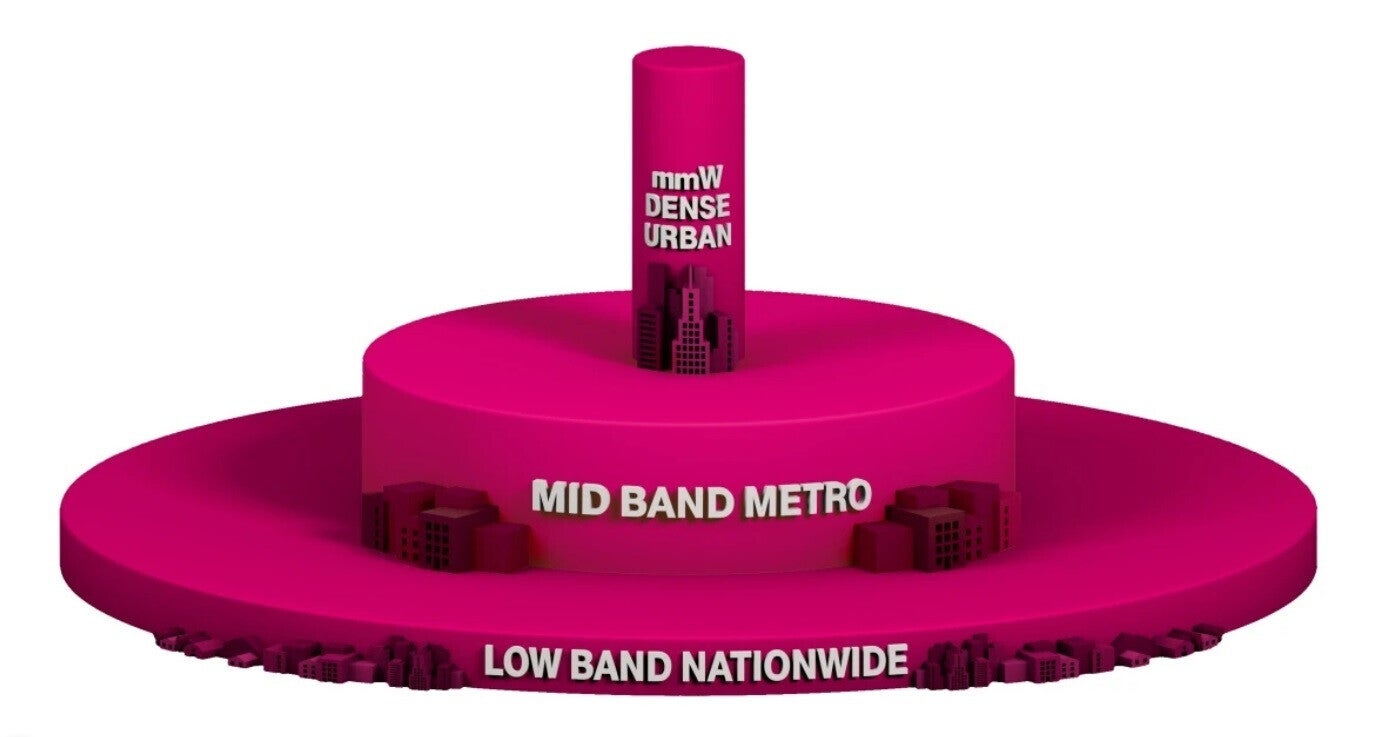In April 2017 T-Mobile spent $7.9 billion in an FCC auction of low-band 600MHz spectrum. The wireless carrier ended up with 31MHz of spectrum, 45% of the total amount that the FCC had up for bids. Dish Network spent the second-largest amount at $6.21 billion. Low-band spectrum travels farther than mid and high-band waves and penetrates structures better. What it doesn’t do is deliver zippy fast download data speeds.
T-Mobile looks to buy more low-band 600MHz spectrum
T-Mobile uses its 600MHz spectrum for its Extended Range 5G service. These signals are more readily available to T-Mobile subscribers than its Ultra Capacity 5G. The latter uses the mid-band 2.5GHz spectrum picked up in the Sprint acquisition and some high-band mmWave signals.
The carrier has said that customers can expect to see download data speeds of 400Mbps and higher with Ultra Capacity 5G. That matches the 400Mbps download speed we achieved with our Pixel 6 Pro on Verizon’s similar 5G UltraWideband network which is also a combination of mid-band airwaves (in the C-band), and mmWave signals.
By combining three channels of mid-band (a process known as carrier aggregation), T-Mobile has been able to achieve 3Gbps download data speeds which is close to mmWave 5G speeds with mid-band availability. At 3Mbps, you can download a feature film in seconds. T-Mobile says that such an amazing 5G experience will be available to its subscribers later this year.
Meanwhile, Fierce Wireless states that T-Mobile is adding to its 600MHz holdings by purchasing spectrum from Channel 51 License Co. for $1.9 billion, and by paying LB License Co. $1.6 billion. Simple math will tell you that the combined purchase price of the additional low-band spectrum comes to $3.5 billion. 20 markets are covered by the airwaves purchased and licenses range from 10MHz to 30MHz in each market.
The markets covered by the acquired spectrum include San Francisco, Atlanta, Chicago, Los Angeles, Boston, Tampa, Columbus, Minneapolis, Seattle, Philadelphia, Baltimore, Washington, DC, Dallas, Phoenix, Houston, Salt Lake City, St. Louis, and New Orleans.
The new 600MHz low-band spectrum that T-Mobile is buying covers 108 million POPs (point of presence) which translates into about a third of the US population. The licenses involved in this purchase are already being used by T-Mobile which had entered into a leasing agreement during the start of the pandemic when wireless carriers sought to expand their coverage.
T-Mobile is the only major US carrier with a dedicated low-band 5G network
Now, T-Mobile is looking to buy the spectrum so that it can own it. T-Mobile CFO Peter Osvaldik made an interesting point during an Oppenheimer investor conference held Tuesday morning. He said, “We’re very differentiated from a 5G perspective, and the low-band layer definitely creates a portion of that. We’re the only ones with a low-band 5G dedicated network. The competition us doing more DSS. Also we’re doing a lot of carrier agg (aggregation) with the mid band layer to enhance the coverage, so that’s another strategic advantage of using 600 (MHz) in that space as well.”
T-Mobile’s triple-layer cake 5G coverage
What Osvaldi noted was that T-Mobile has its 600MHz dedicated low-band network. Verizon and AT&T uses Dynamic Spectrum Sharing (DSS) to deliver their nationwide 5G coverage instead of using low-band like T-Mobile. With DSS, LTE and 5G service can be delivered from the same spectrum band.
T-Mobile is also looking to fill some of the holes in its nationwide mid-band coverage by participating in FCC Auction 108 which has more 2.5GHz mid-band spectrum up for bids. New Street Research has lowered its estimate of what it expects T-Mobile to spend at Auction 108 from $3.4 billion to $0.8 billion. The $2.6 billion that the research firm expects T-Mobile not to spend on the auction will be applied towards the purchase of additional 600MHz spectrum.
In what is actually a positive sign for Dish Wireless, New Street points out that T-Mobile’s 600MHz purchase “is a positive sign for spectrum values and for Dish in particular. The value of 600 MHz has more than doubled over five years. This would suggest that Dish’s 600 MHz holding will have more than doubled from $6 billion to almost $15 billion. In an environment where investors are worried about Dish’s ability to raise capital against spectrum assets, a mark on value like this is very helpful.”
The additional spectrum purchases are good news for T-Mobile but for Dish, having one of its major assets more than double in value could help it raise the cash it needs to continue building the nation’s “fourth nationwide facilities-based network competitor.”
Back to T-Mobile now. The carrier is expected to spend $4.25 billion on spectrum in 2022.
